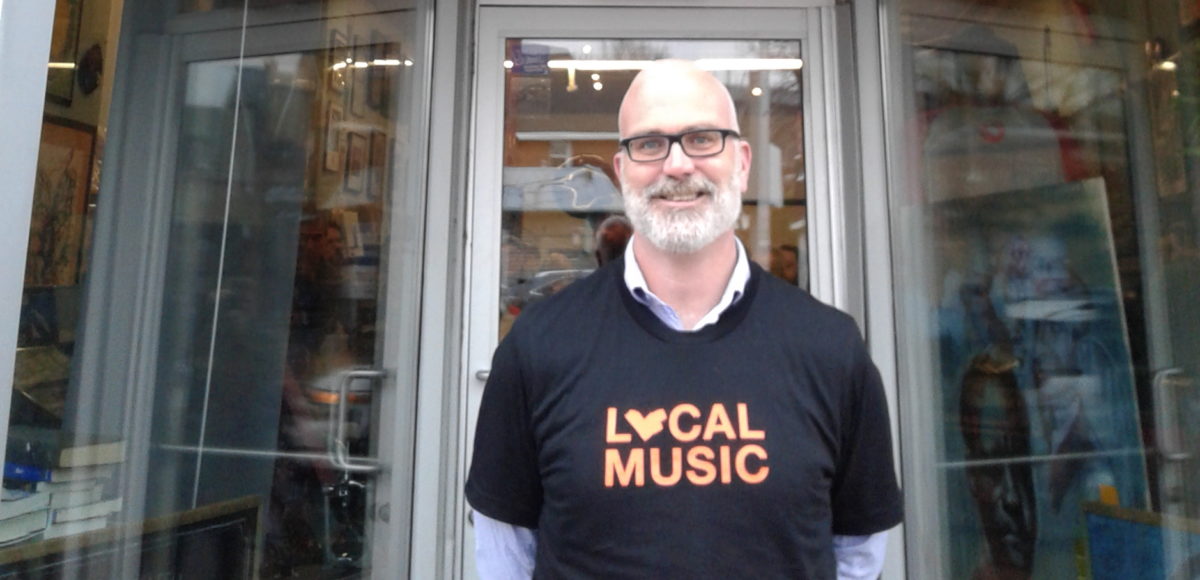If there is culture club at Ottawa City Hall, Jeff Leiper is a card-carrying member.
The Kitchissippi councillor is an enthusiastic champion of Ottawa’s music industry and is working with the Ottawa Music Industry Coalition and other stakeholders on a strategy for local music.
He’s read a draft version of the strategy and without getting too specific, he says he likes what he sees. In an interview conducted at the recent launch of OMIC’s Love Local Music campaign in Hintonburg, he said the draft includes mention of the need for a 1,000 seat concert venue downtown and makes some suggestions for zoning changes and other things that could make the business of music making easier. The final version should be coming forward early in 2018, he added.
There is also a $100,000 investment in the city budget for 2018 that will accompany the music strategy and spent as needed.
“The strategy will suggests things that the city can do to help improve our music industry and it will suggest things that the industry itself can do,” he said on the sidewalk outside the The Record Centre on Wellington Street.
The document is being pulled together by OMIC and staff from the city’s cultural office and from the economic development office and the money is coming from economic development for the most part.
While the plan is being finalized a possible venue for a concert hall if Carleton University decides to assume responsibility for Dominion-Chalmers United Church on O’Connor Street and turn it into a venue for its music program and for the community at large.
A feasibility study goes before the university’s board of governors Dec. 5 and the city is watching closely, Leiper says.
“There is discussion around who could the partners be to make a sustainable business case for Dominion-Chalmers and Carleton.”
He says there is awareness that the city may need to “do some work” on revising zoning bylaws to improve things for music enterprises.
Bigger issues such as the state of arts funding in Ottawa, which many say is too low, will have to wait, he says.
“This is a really contentious discussion (at council),” he says. “You have (the arts community) folks who are raising it on every budget cycle.
“We developed a cultural plan in 2012 and haven’t funded much of the stuff that was in there especially with respect to operational support for festivals and artists.”
But the city has made a major commitment to the $100 million rejuvenation of Arts Court as a visual arts centre and as a theatre venue, along with a condo development. The project has seen about $40 million in public money with private sector partners and uOttawa also involved. The new building is expected to open in the near future, several months after its original opening planned for the summer of 2017.
Leiper says the investment the city has made in Arts Court has been very significant.
“It will be an amazing ribbon cutting but we can’t lose sight of the fact that we have to have artists who are making a living in Ottawa to play and exhibit and read and all the various things” that artists do.
That aside, Leiper says the current “council does not seem keen to invest on top of that.”
He hopes the next council, after municipal elections in 2018, will be different.
For now the music strategy offers the hope of action without much cost.
“One of the reasons I am interested in it,” he said, “is because it is a relatively low investment to get. potentially, a very high return.”
The poster child for a vibrant music scene what it can do for a city is Austin Texas, which hosts the annual South by Southwest gathering every year which attracts tourists and industry insiders from around the world.
Ottawa, despite being about the same size, is not Austin, he says.
“We have to get audiences used to going to shows first in a government town that’s a bit sleepy.”
He hopes the expanded light rail transit system will help, starting in 2018.
He also believes that more and more councillors are starting to understand the potential benefits that a vibrant culture, that extends beyond federal institutions such as the National Arts Centre, can bring, including cultural tourists and high tech headquarters such as is being dangled by Amazon.
“You can do a lot with salary and foosball tables in the office. But if there’s nowhere to go after work, these businesses, and their young employees, won’t be interested,” he said.
The new economy means there needs to be a change in the way economic development and city building is done, he said, just before he went back inside The Record Centre and caught the rest of the set featuring Catriona Sturton.







